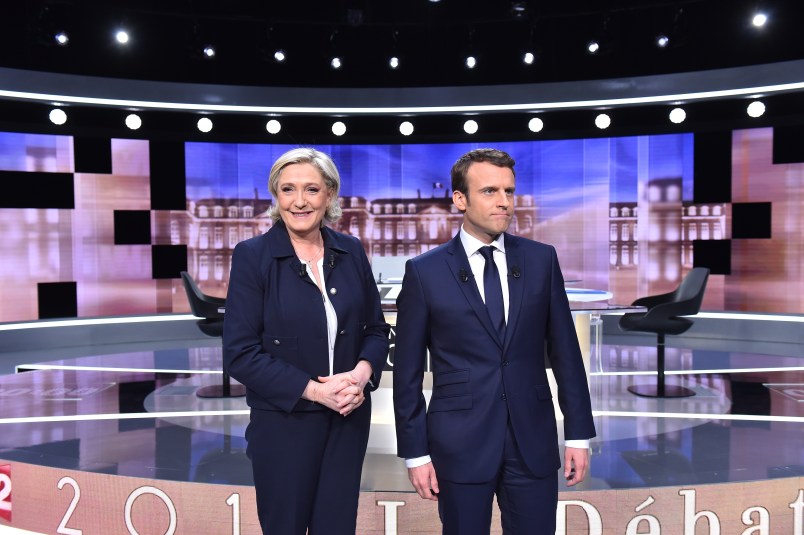In the last week of France’s presidential election, posters sprung up picturing Marine Le Pen with Donald Trump’s hairdo. The message was clear. Saying “yes” to Le Pen was saying “yes” to Trump. Ads also ran advising voters “ne vous Trumpez pas,” a pun on the verb “tromper” meaning “do not deceive yourself.” My suspicion is that Trump’s election did hurt Le Pen. I haven’t found any evidence from polling, but there is a telling succession of events that suggests a negative Trump effect.
After Trump’s upset victory in November, the European parties and politicians that were politically close to him expected to get a boost, but exactly the opposite has happened. In Austria last May, Green Party candidate Alexander Van den Bellen edged populist right candidate Norbert Hofer of the Freedom Party by .4 percent. A court heeded a Freedom Party protest and threw out the results and called for a new election. In December, in the wake of both Brexit and Trump’s victory, Van den Bellen easily defeated Hofer by 53.3 to 46.7 percent.
In Germany, the Alternative for Deutschland (AfD) party, which targeted immigrants and asylum-seekers, had seen its popularity grow in the wake of the Cologne New Year’s Eve riot. Would it join the Christian Democrats, Social Democrats, Greens, and Free Democrats as one of Germany’s major parties? But in subsequent elections, it has fallen flat, while the Christian Democrats, identified with German Chancellor’s Angela Merkel’s refusal to heed Trump’s bullying, has seen its vote rise. In March regional elections in Saarland in southwest Germany, Merkel’s party won 40.2 percent (up from 35.2 percent in 2012), while the AfD, which had previously been running as high as 16 percent in national polls, won only 6.2 percent. In elections this Sunday in Schleswig-Holstein the Christian Democrats increased their margin from 30.8 to 33 percent while the AfD was only 5.6 percent, falling well behind the other parties.
But perhaps the most telling result was in the Dutch elections March 15. For 18 months, Geert Wilders of the Party of Freedom had led all the parties in the polls. Wilders had expected to benefit from Trump’s victory, which he had celebrated as a “Patriotic Spring.” Wilders said, “We will see also in Europe that things will change, politics will never be the same and what I call the Patriotic Spring will have an enormous incentive. The lesson for Europeans is look at America. What America can do, we can do as well.” But Wilders got only 13.1 percent of the vote, well behind center-right Mark Rutte’s People’s Party, which got 21.3 percent. And the two parties that gained the most seats, the Left Greens and D66, were the most outspokenly opposed to Wilders’ anti-Islamic politics.
Why didn’t Trump and Brexit provide a bounce for these politicians? One factor is that Trump, with his strident dismissal of NATO and the European Union, his jibes against Merkel and Germany, his near-endorsement of Le Pen, united West Europeans the same way that George W. Bush did in 2003. Another factor, important in France, was that Trump’s blustering know-nothingness seems to have frightened and offended voters. In her debate with Macron on election eve, Le Pen’s own harsh rhetoric, combined with her refusal to get into details about her program, probably reinforced the impression that she was a French version of Trump, leading to a sharp drop in her polling numbers prior to the election.






